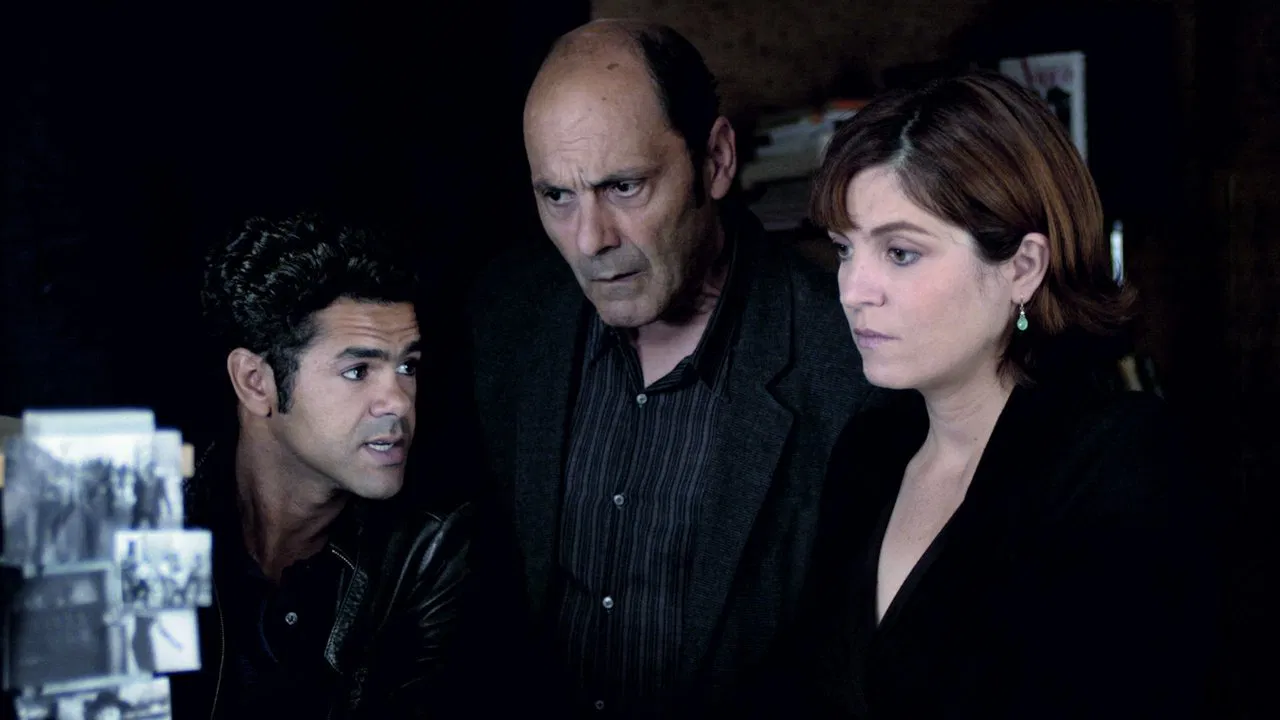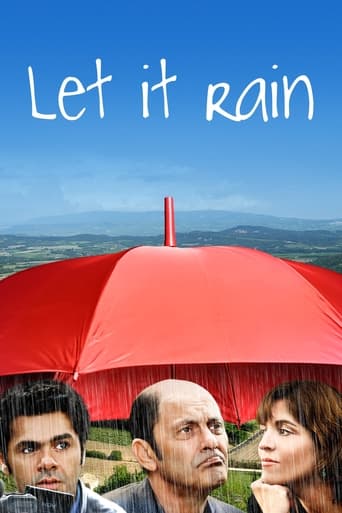

Greetings,I speak French, but I am also a linguist with translation background, so I am always interested in Dubbing. I noticed that when you get to the Arabic parts of the movie, no dubbing is provided. Instead this phrase is used Arabic Speaking, as if there are no Arabic speakers to help translate that section, or even worse, as if the content and intent of those sections are of little import, to bother with translating them. Omitting those sections from the Dubbing, reduces the impact, and does not provide a full experience to the user.Just saying. Would be more than happy to provide the translation, free of cost.Great movie!Thank you!
... View MoreWhen I say "an American opinion" I don't mean "an idiot's opinion" although that has been known to happen. No, I just mean that this is the opinion of someone whose approach to cinema is somewhat sociocentric--that here we only have access to films that are "mainstream" or, at best, foreign films that win awards at Cannes or are aggressively marketed for USA audiences. This film didn't win any awards that I know of, thus in popularity it plays second fiddle to writer/director/actress Agnès Jaoui's 2000 debut "The Taste of Others" which is similarly about the polite social & racial barriers that exist in everyday life."Parlez-moi de la pluie" (literal translation: "Speak to me about the rain") takes its title from an old French song by Georges Brassens called "L'Orage" ("The Storm"), a humorously tragic diddy about a man who has a 1-time affair with the wife of a lightning-arrester salesman during a thunderstorm. Unfortunately, the song never appears in the film although it does feature a snippet of the beautifully nostalgic "Twelfth of Never" by Nina Simone. What is the significance of the title? I'm still not sure, but the film definitely investigates the theme of covert/forbidden love and the purgatory of those who dwell in such affairs ("the other woman" or "the other man").There are 3 love stories intertwined: A filmmaker is making a documentary about a feminist activist who happens to be the sister of the woman he is having a secret affair with, while secondly, the activist is having trouble with her own love life because her boyfriend feels that her career is her only true love, and thirdly, the filmmaker's assistant is a married man growing increasingly tempted by the overtures of a young woman he knows at work. Add to the jumble the fact that the assistant is the son of the maid who has worked in the activist's home all her life, and you have a bona fide Shakespearean comedy of errors, right?Well, not exactly. And this is where my "American idiot" possibly comes in: I just didn't find the script to be very funny. The movie is listed as a comedy, so I assume I was supposed to laugh, but instead I found myself taking the situations very seriously. The funniest bits came from the filmmaker (played by Jean-Pierre Bacri) who we soon learn is a bumbling idiot behind the camera. Bacri's hushed arguments with his assistant (Jamel Debbouze, famous for his role as the grocery boy in "Amélie") were pretty funny and served to freshen things up every few minutes. Other than that, I felt like this was a pretty serious drama, heavy on interpersonal relationships and the complexities of social barriers that we impose upon ourselves. If you're ready for something like that, not a breezy comedy by any means, then you might enjoy this film.While investigating the barriers of love & marriage, the film also focuses on social/racial barriers. Here I thought the film did an excellent job due to Jamel Debbouze's brilliant acting. Since he is the son of the activist's maid, he is conventionally subordinate to her and her family, even though they are now working together as equals. His facial expressions and short words say it all, like the scene where they are all having a garden party at an immaculately set table, and his mother is serving them. Jamel refuses to sit down and doesn't eat or drink anything, though nobody seems to notice his furious defiance. Later in the film, as his oppression comes to a boil, he exposes his "employers" with a powerful monologue--not about overt racism but about the insidious mockery of civilized bigotry that the elite commit without even knowing it. It really makes you stop and look at your own life, wondering if you may be guilty of the same offense.And it's that last bit (and Jamel's memorable performance) that makes this a worthwhile film even though the comedy may fall short. Perhaps in France people understand the humor better. I do speak French but I still didn't really get any big laughs. But in the end I thought this was a nice character-driven story of everyday life. Agnès Jaoui's work has been compared to that of famed French director Eric Rohmer, and I can definitely see similarities to Rohmer's films like "A Tale of Springtime" in which simple conversations engender complicated human interactions. On the American side of the camera she reminds me of indy film darling Miranda July ("The Future", "Me and You and Everyone We Know") but without July's quirky humor. Or maybe Janoui's humor is there but I just didn't get it because I'm an American idiot ;)
... View MoreThe story is set in a small town in the Midi, in France. Throughout the film, as the characters appear, they are revealed through dialogs they carry on with each other. So, as the film goes on, we have the feeling that things are rather stuck in this place.Michel, nearly fifty, aspires to be a reporter-filmmaker that he didn't succeed to be so far. It is, actually, a clumsy, nonchalant guy, who doesn't do right what he intend to, and relieves his frustration smoking joints. He is divorced, has a teenage son with whom he spends a weekend once in a while, and is having a future less affair with Florence's sister, Agathe, who is married to Stéphane.Florence, nearly forty, Agathe's sister, is married to Stephane. They have two children. But she feels miserable with her housewife life, along with a husband who has no energy to solve the shaky family financial situation. She seems to bet on her relationship with Michel to get free from her situation. This way of seeing the future makes her a kind of a bovarist.Karim, has qualities that were frustrated by his humble origins and perhaps also because he lived all his life in a small town where the opportunities are scarce. He is the son of a maid (Mimouna) born in the Maghreb, and who works for Florence and lives in the house of this latter. Karim works as a receptionist in a small and modest hotel, down town. He is skilled in film mounting and tries to get free of his mediocre situation as a receptionist, working on projects of Michel, who rarely reach an end, because of Michel style.Agathe, lives currently in Paris (she developed a career away from that Midi where things are rather stuck). She has a comfortable social position, and is successful professionally as a politician. She visits the small town where she spend her childhood, to tackle some political issues, and problems related with the heritage left by her mother. At the beginning of history, she looks like some one who is well resolved psychologically. But throughout the film we realize that this is not true. Her passage through the small town triggers the hole story.Mimouna, mother of Karim, comes from the Maghreb. She has been working for many years for the Villanova family, since when they lived in Algeria (?). In the past, she babysitted Florence and Agathe who have a strong relationship with her. She lives apart from her husband who abandoned the family in circumstances apparently nasty.
... View MoreAgnes Jaoui's films 'Le Gout des autres' and 'Comme une image' are among my favourites of contemporary French cinema. They're smart, well-written, understated comedies that get right under the skin of middle class relationships and neuroses. As such, this, her latest, is an enormous disappointment. The humour is forced and the characters are under-drawn - what is a relatively short movie felt very long indeed. The subtlety of Jaoui's previous films was completely missing - it's as if she's aiming for a much broader audience. Fatally, almost all of the characters are completely unsympathetic - the one exception is an old North African woman played by Mimouna Hadji. I really couldn't care less about these people, their failing relationships or their political ambitions because they just didn't ring true. I suspect that this is a film that will find a limited audience outside France.
... View More